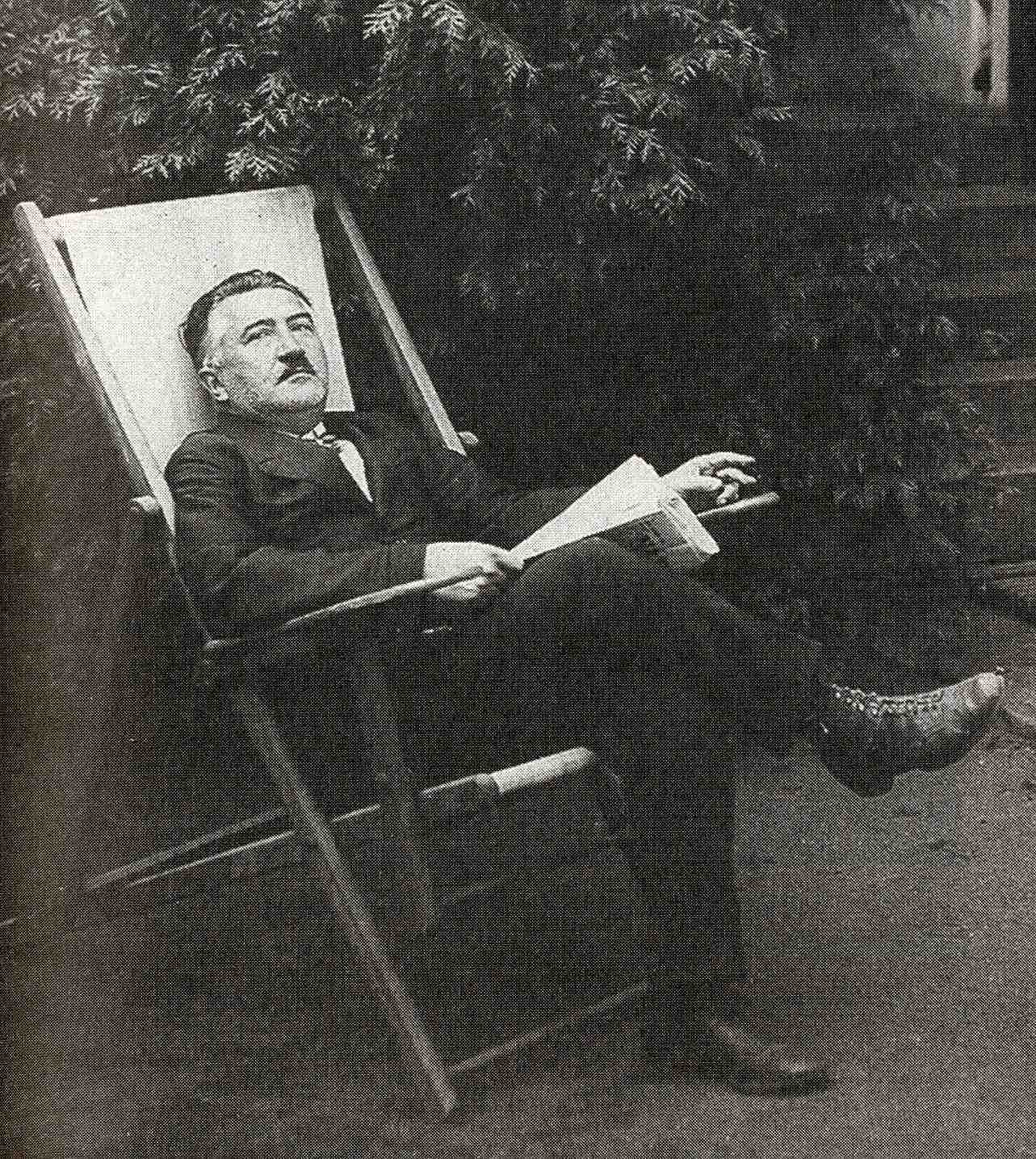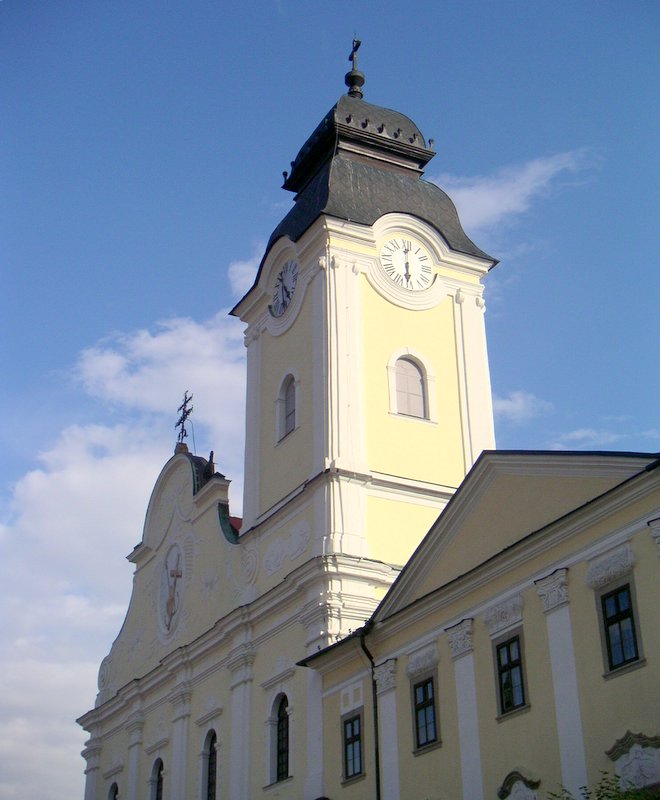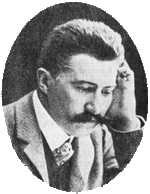|
Josef Suk (composer)
Josef Suk (4 January 1874 – 29 May 1935) was a Czech composer and violinist. He studied under Antonín Dvořák, whose daughter he married. Biography From a young age, Josef Suk (born in Křečovice, Bohemia) was deeply involved and well trained in music. He learned organ, violin, and piano from his father, Josef Suk Sr., and was trained further in violin by the Czech violinist Antonín Bennewitz. His theory studies were conducted with several other composers including Josef Bohuslav Foerster, Karel Knittl, and Karel Stecker. He later focused his writing on chamber works under the teachings of Hanuš Wihan. Despite extensive musical training, his musical skill was often said to be largely inherited. Though he continued his lessons with Wihan another year after the completion of his schooling, Suk's greatest inspiration came from another of his teachers, Czech composer Antonín Dvořák.Tyrell, Grove. Page 1 Known as one of Dvořák's favorite pupils, Suk also became personally ... [...More Info...] [...Related Items...] OR: [Wikipedia] [Google] [Baidu] |
Křečovice
Křečovice is a municipality and village in Benešov District in the Central Bohemian Region of the Czech Republic. It has about 800 inhabitants. Administrative parts Villages and hamlets of Brdečný, Hodětice, Hořetice, Hůrka, Krchleby, Lhotka, Nahoruby, Poličany, Skrýšov, Strážovice, Vlkonice, Zhorný and Živohošť are administrative parts of Křečovice. In popular culture A comedy film ''My Sweet Little Village'' was filmed there in 1985. Notable people *Josef Suk (composer), Josef Suk (1874–1935), composer; his home is now the Josef Suk Memorial References External links * Villages in Benešov District {{CentralBohemia-geo-stub ... [...More Info...] [...Related Items...] OR: [Wikipedia] [Google] [Baidu] |
Alban Berg
Alban Maria Johannes Berg ( , ; 9 February 1885 – 24 December 1935) was an Austrian composer of the Second Viennese School. His compositional style combined Romantic lyricism with the twelve-tone technique. Although he left a relatively small ''oeuvre'', he is remembered as one of the most important composers of the 20th century for his expressive style encompassing "entire worlds of emotion and structure". Berg was born and lived in Vienna. He began to compose only at the age of fifteen. He studied counterpoint, music theory and harmony with Arnold Schoenberg between 1904 and 1911, and adopted his principles of ''developing variation'' and the twelve-tone technique. Berg's major works include the operas ''Wozzeck'' (1924) and ''Lulu'' (1935, finished posthumously), the chamber pieces '' Lyric Suite'' and Chamber Concerto, as well as a Violin Concerto. He also composed a number of songs ('' lieder''). He is said to have brought more "human values" to the twelve-tone system, ... [...More Info...] [...Related Items...] OR: [Wikipedia] [Google] [Baidu] |
Levoča
Levoča (; hu, Lőcse; rue, Левоча) is a town in the Prešov Region of eastern Slovakia with a population of 14,700. The town has a historic center with a well preserved town wall, a Gothic church with the highest wooden altar in the world, carved by Master Pavol of Levoča, and many other Renaissance buildings. On 28 June 2009, Levoča was added by UNESCO to its World Heritage List. Etymology The name is of Slovak origin and belongs to the oldest recorded Slovak settlement names in Spiš. It was originally the name of the stream Lěvoča, a tributary of river Hornád (present-day Levočský potok). The name probably derived from the adjective ''lěva'' (left, a left tributary); the linguist Rudolf Krajčovič has also suggested as an origin the word ''lěvoča'' meaning "regularly flooded area". History Levoča is located in the historical region of Spiš, which was inhabited as early as the Stone Age. In the 11th century, this region was conquered and, subsequently, ... [...More Info...] [...Related Items...] OR: [Wikipedia] [Google] [Baidu] |
Josef Suk Museum
Josef Suk Memorial is a museum in Křečovice, a village in the Central Bohemian Region of the Czech Republic. It was the home of the composer and violinist Josef Suk (1874–1935), and is now a museum dedicated to him. Description The house was built for the composer in 1895 by his father Josef Suk senior, a head teacher and director of the church choir in the village. The Bohemian Quartet, of which Suk was a founding member, rehearsed here, and he composed most of his works here."Josef Suk Memorial" Czech Museum of Music. Retrieved 9 June 2021. After his death, his son Josef Suk (father of the violinist Josef Suk) made the house into a museum dedicated to the composer, and in 1951 he donated the house to the ... [...More Info...] [...Related Items...] OR: [Wikipedia] [Google] [Baidu] |
Incidental Music
Incidental music is music in a play, television program, radio program, video game, or some other presentation form that is not primarily musical. The term is less frequently applied to film music, with such music being referred to instead as the film score or soundtrack. Incidental music is often background music, and is intended to add atmosphere to the action. It may take the form of something as simple as a low, ominous tone suggesting an impending startling event or to enhance the depiction of a story-advancing sequence. It may also include pieces such as overtures, music played during scene changes, or at the end of an act, immediately preceding an interlude, as was customary with several nineteenth-century plays. It may also be required in plays that have musicians performing on-stage. History The use of incidental music dates back at least as far as Greek drama. A number of classical composers have written incidental music for various plays, with the more famous e ... [...More Info...] [...Related Items...] OR: [Wikipedia] [Google] [Baidu] |
Fairy Tale (Suk)
', Op. 16 (''Fairy Tale'') is an orchestral suite from incidental music composed for Julius Zeyer's mythological drama '' Radúz and Mahulena'' by Josef Suk in 1897–1898. Background Zeyer's dramatic poem is a love story, combining classical fairy-tale motifs with mythological references. Suk started to write incidental music in 1897 and soon became very attached to the material. In the end he wrote overtures to each scene, intermezzos, as well as various vocal solos and choruses. The play was first performed on 6 June 1898 at the National Theatre in Prague, under the baton of Adolf Čech. Because of the chance of the play receiving regular staging was small, Suk decided to turn most of the music into a four-movement orchestral suite. Suk began to work on the suite on 2 September 1899 at his home in Křečovice and completed the first two movements by the end of the month. Because of the extensive touring with Bohemian Quartet he didn't start to work on the third movement un ... [...More Info...] [...Related Items...] OR: [Wikipedia] [Google] [Baidu] |
Radúz And Mahulena
''Radúz and Mahulena'' is an 1898 stage play by Czech novelist Julius Zeyer. It was made into a film in 1970, directed by Petr Weigl. Story Zeyer's dramatic poem is a love story, combining classical fairy-tale motifs with mythological references. Radúz and Mahulena, from feuding kingdoms, fall in love, but have to face various challenges, including the sorcery of Queen Runa. As well as Slovak myths and fairy tales, the story also draws from the Indian drama '' Shakuntala'' by the poet Kalidasa. Film cast *Directed by Petr Weigl. * Magda Vašaryová as Mahulena *Jan Tříska as Radúz * Jiří Adamíra as Stojmír * Vladimír Ráž as Radovíd * Jaroslava Adamová as Runa * Nada Urbánková as Prija * Jaroslava Obermaierová as Živa *Dana Medřická as Nyola * Václav Mareš as Pribina *Vladimír Menšík as Vratko * Marie Popelková as Maid of Honour * Jiří Hospoda as Lover * František Michálek as Herold * Richard Záhorský as Sawyer *Petr Svojtka Petr Svojtka ... [...More Info...] [...Related Items...] OR: [Wikipedia] [Google] [Baidu] |
Julius Zeyer
Julius Zeyer (26 April 1841 – 29 January 1901) was a Czech prose writer, poet, and playwright. Personal life Zeyer was born on 26 April 1841 in Prague. His mother, Elisabeth Eleonora (née Weisseles), came from a German Jewish-turned-Catholic family, and his father, Jan Zeyer, was a carpenter and timber merchant with relations to French ( Alsatian) nobility. He was taught to speak Czech by his nanny. Growing up, he was expected to take over the family's factory but decided to study carpentering instead. All of his attempts at graduation from high school or university were unsuccessful. He spent a significant portion of his life travelling across Europe and the East. In around 1877, he moved to Vodňany, where he spent over a decade focusing on his literary work. His last years were spent living in Prague. Works Zeyer's prose and poems convey a sense of restlessness, nostalgy, mysticism, and gloominess, and generally feature tragic endings. He combined European and Eastern my ... [...More Info...] [...Related Items...] OR: [Wikipedia] [Google] [Baidu] |
Symphonic Poem
A symphonic poem or tone poem is a piece of orchestral music, usually in a single continuous movement, which illustrates or evokes the content of a poem, short story, novel, painting, landscape, or other (non-musical) source. The German term ''Tondichtung (tone poem)'' appears to have been first used by the composer Carl Loewe in 1828. The Hungarian composer Franz Liszt first applied the term ''Symphonische Dichtung'' to his 13 works in this vein. While many symphonic poems may compare in size and scale to symphonic movements (or even reach the length of an entire symphony), they are unlike traditional classical symphonic movements, in that their music is intended to inspire listeners to imagine or consider scenes, images, specific ideas or moods, and not (necessarily) to focus on following traditional patterns of musical form such as sonata form. This intention to inspire listeners was a direct consequence of Romanticism, which encouraged literary, pictorial and dramatic ... [...More Info...] [...Related Items...] OR: [Wikipedia] [Google] [Baidu] |
Ripening (Suk)
''Ripening'' ( cz, Zrání), Op. 34 is a tone poem for large orchestra and women's chorus by Josef Suk. Composition was completed in 1917. The work completed the triptych of symphonic works that starts with the '' Asrael Symphony'' and '' A Summer's Tale''. Structure and character The work was inspired by the same-named poem by Antonín Sova. It is in seven sections. Rob Cowan has written "There can't be many orchestral works in the repertoire that better approximate, in musical terms, the blossoming of life in the face of conflict, even tragedy". Don O'Connor wrote for the American Record Guide The ''American Record Guide'' (''ARG'') is a classical music magazine. It has reviewed classical music recordings since 1935. History and profile The magazine was founded by Peter Hugh Reed in May 1935 as the ''American Music Lover''. It chang ... that the piece represented "Suk's art at its peak and compares favorably with the best tone poems of Scriabin and Richard Strauss". ... [...More Info...] [...Related Items...] OR: [Wikipedia] [Google] [Baidu] |
Josef Suk Deska , a Japanese manufacturer of musical instruments
{{disambiguation ...
Josef may refer to *Josef (given name) *Josef (surname) * ''Josef'' (film), a 2011 Croatian war film *Musik Josef Musik Josef is a Japanese manufacturer of musical instruments. It was founded by Yukio Nakamura, and is the only company in Japan specializing in producing oboe The oboe ( ) is a type of double reed woodwind instrument. Oboes are usually ma ... [...More Info...] [...Related Items...] OR: [Wikipedia] [Google] [Baidu] |
Czech Republic
The Czech Republic, or simply Czechia, is a landlocked country in Central Europe. Historically known as Bohemia, it is bordered by Austria to the south, Germany to the west, Poland to the northeast, and Slovakia to the southeast. The Czech Republic has a hilly landscape that covers an area of with a mostly temperate continental and oceanic climate. The capital and largest city is Prague; other major cities and urban areas include Brno, Ostrava, Plzeň and Liberec. The Duchy of Bohemia was founded in the late 9th century under Great Moravia. It was formally recognized as an Imperial State of the Holy Roman Empire in 1002 and became a kingdom in 1198. Following the Battle of Mohács in 1526, the whole Crown of Bohemia was gradually integrated into the Habsburg monarchy. The Protestant Bohemian Revolt led to the Thirty Years' War. After the Battle of White Mountain, the Habsburgs consolidated their rule. With the dissolution of the Holy Empire in 1806, the Cro ... [...More Info...] [...Related Items...] OR: [Wikipedia] [Google] [Baidu] |

_~1930_©_Max_Fenichel_(1885–1942).jpg)

